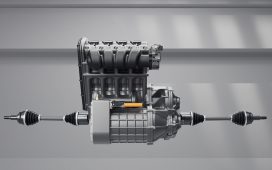Imagine where 10 more years could take the technology.
YORKTON – What will the vehicles we drive look like in say a decade from now?
Ten years is not too great a length of time, but one should expect some rather dramatic changes in vehicles given a number of factors.
To start with there is the idea of autonomous driving vehicles.
Some of course see the idea as absurd, at least on a large scale, given the ever changing conditions we face as we drive. Can sensors recognize every danger, and will a computer make the correct decision to deal with the massive pothole, a child running into the street, or a patch of black ice?
Of course the response to that concern is that human drivers don’t themselves do a particularly good job behind the wheel, which accounts for so many deaths on our highways, and countless accidents which keep fleets of tow trucks busy.
In some situations autonomous – once fine-tuned – will be better. The computer won’t get behind the wheel intoxicated, and won’t fall asleep after a long day.
Conversely there will be times a human driver would likely do better.
The bottom line in my mind though is autonomous vehicles are a thing, and a decade from now are going to be in broader use.
Of more interest to farmers and to Western Canada is what fuel will be powering our vehicles.
In Saskatchewan and Alberta, many are still going to rally to the cause of oil, and given the wealth of big oil companies to lobby, gasoline and diesel are going to be around for far longer than a decade.
But, there is a government push, fuelled at least in part by a broader consumer demand than you find from people on the Prairies, to move away from fossil fuels.
Farmers aren’t totally opposed to that idea, since blending renewable fuel into gasoline and diesel can be one way to achieve a reduction.
Ethanol from grain and canola based bio-diesel can be a huge boon as an alternate market for farmers, although it does come with a caveat of worry whether grain for cars is a good thing when too many still starve in this world.
There are also those who see electric as the way to leave fossil fuels to the history books.
Like much of the likely changes to what we drive, electric vehicles have holes to patch, from sources of resources such as lithium, the environmental impact of disposing of old cars/batteries, how far a battery charge takes you, and can the power grid deal with hundreds of thousands of electric cars charging?
But think back 10 years and electric cars were pretty much the stuff of science fiction, and today most dealership have them in their lots.
Imagine where 10 more years could take the technology, and might farming have a role to play in what will be a decidedly different vehicular future.
Don’t count on social media to deliver your local news to you. Keep local news a touch away by bookmarking the Assiniboia Times homepage at this link.
Here’s why you should bookmark your favourites.
Bookmark SASKTODAY.ca, Saskatchewan’s home page, at this link.









